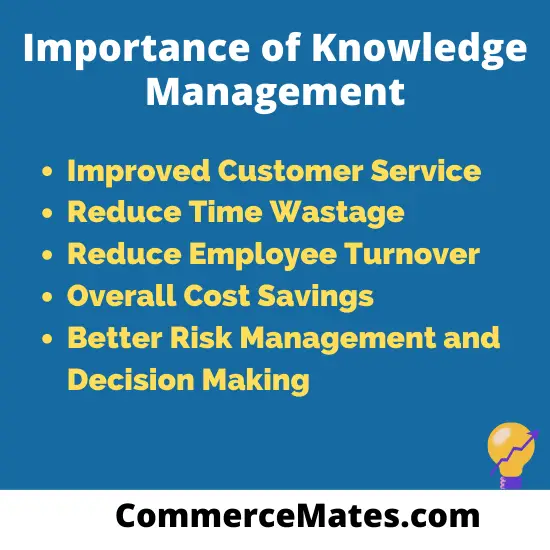Contents
What is Knowledge Management?
Knowledge management refers to identifying, creating, sharing, and using knowledge within an organization. It includes the strategies and technologies used to capture, store, and distribute knowledge and the people and processes involved in creating and using knowledge.
Organizations use the knowledge they collect to improve performance, service delivery, and competitiveness. Knowledge management, commonly called KM, can also help organizations avoid reinventing the wheel and use their resources better while saving time.
Imagine employees having access to information at any time. You will achieve streamlined business processes, which can help achieve business goals. Knowledge is power; to an organization, it’s also capital, whether explicit, tacit, or implicit.
The Objectives of Knowledge Management
The five main objectives of knowledge management are:
Capture and Store Knowledge
Knowledge management aims to capture and store knowledge from different sources to help run a business effectively. The process involves identifying key sources of knowledge within an organization, such as internal documents, databases, customer communications, lessons from failures, and employee expertise. It also means finding an effective way to store and manage this knowledge.
Companies should have a knowledge management system (KMS) to manage their collected knowledge. A KMS acts as a repository for all the knowledge in an organization. Without a KMS, it can be challenging for employees to share their hard-earned knowledge, especially if no one recognizes it.
Provide and Retain Accessible and Accurate Information
Knowledge management transforms individual knowledge and expertise into structural capital, making it more accessible and usable information. The organization and integration of knowledge from different sources offer accurate and up-to-date information to employees at any time. This brings about a clear and common understanding of business and customer service.
Retaining knowledge in the organization’s system (and not in people’s minds) ensures it stays within the company even if those who contributed to it leave.
Improve the Organization’s Efficiency
Effective knowledge management can improve efficiency by reducing redundant tasks and streamlining operations. Knowledge management encourages collaboration and communication so organizations can work more efficiently and effectively. It also ensures information is readily available, reducing disruptions, search times, and errors arising from incorrect information. As a result, there will be a positive impact on decision-making, the use of resources, productivity, and the company’s bottom line.
Promote Innovation and Cultural Change
At its core, knowledge management is all about promoting innovation and cultural change within organizations. Collecting and sharing knowledge encourages creativity, new ways of thinking, and utilizing talents. This knowledge can help create a more unified and informed workforce.
Knowledge-empowered employees are more likely to buy into and support company organizational change. The availability of knowledge also helps organizations keep track of the latest trends and best practices, enabling a company to stay ahead of the curve, stay competitive, and shape current and future direction.
Importance of Knowledge Management
Knowledge management facilitates learning by providing employees access to relevant information and resources. This enhances their skills, competencies, and capabilities.

Improved Customer Service
Knowledge management can help employees understand customer needs and preferences better. As a result, customers can receive more personalized and effective services.
Employees can also solve customer issues without delays, increasing customer satisfaction. A happy customer means more business, even from referrals. Research shows 77% of customers say an excellent customer experience has a significant impact on increasing brand loyalty.
Reduce Time Wastage
Employees spend around 2 hours daily searching for information from documents or people. With a knowledge management system, an organization can eliminate time wastage since all data will be in a central place, where everyone has easy access.
With a well-designed operation management system, searching for information can take seconds, minimizing nonproductive hours and motivating employees to do more. Organizations can avoid duplicating tasks, meaning employees can concentrate more on essential operations. In short, organizations streamline operations, increasing productivity.
Reduce Employee Turnover
A knowledge management system helps employees become more engaged and invested in their work. And since knowledge is one of the crucial tools for performing tasks seamlessly, having it readily available can reduce their frustrations.
Employees feel valued when they share their knowledge with others and are rewarded. This can boost communication and reduce silos. They also become satisfied when they are more comfortable in their workplace, meaning they are less likely to leave.
Looking at this from another angle, having a system to manage your employees’ knowledge can also help you retain institutional knowledge. As a result, you can avoid the costly mistakes that can come with high turnover. When employees leave your organization, they go with what they know. However, having a knowledge management system helps you keep that knowledge within your company.
Better Risk Management and Decision Making
Employees and business owners can make informed decisions to mitigate and manage risks if they’re equipped with timely and accurate information. Historical data, best practices, FAQs, guides, and lessons learned from experiences are crucial to most company decision-making.
By leveraging this information, organizations can avoid repeating mistakes that they have made in the past. As a result, a business can prevent reputational damage and ensure its continuity.
Overall Cost Savings
Knowledge management can reduce the time and resources needed to complete tasks, streamline processes, reduce employee turnover, and increase customer satisfaction. It also facilitates speedy and effective onboarding and reduces employee mistakes. All this helps reduce overall company costs.
Bottom Line
Knowledge management aims to help an organization run more efficiently and effectively by sharing and utilizing knowledge effectively. As a result, businesses improve service delivery, employee satisfaction, productivity, and time management. In addition, they improve communication, reduce silos, and promote creativity and innovation.
A knowledge management system helps organizations shape their current and future direction by being aware of the changing knowledge needs due to technological advancements. Collecting different individuals’ skills, talents, and experiences keeps you on top of your game, resulting in increased revenue.